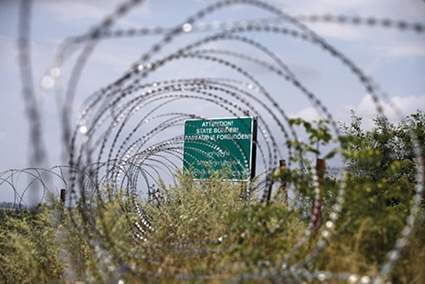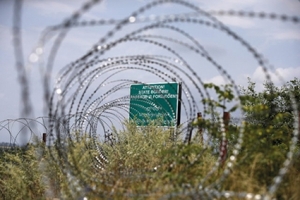The Latest Victim of Borderization: Gugutiantkari
Russian occupation forces recommenced the illegal installation of barbed wire fences in the village of Gugutiantkari, located close to the occupied region of Tskhinvali (South Ossetia), on Monday. Georgian and foreign politicians, as well as public figures, have condemned the move by Russian forces.
The installation of barbed wire fences was launched by military forces on August 7 and restarted on August 14, after a week-long pause. Later, it was suspended for several days and resumed on August 19. ‘Borderization’ has affected a number of families, seeing them deprived of access to their plots of land, while two houses there have been completely absorbed into the occupied territory.
Gori Mayor Konstantine Tavzarashvili spoke out against the illegal borderization on Monday, saying “Unfortunately, occupation forces have resumed the illegal process of borderization, which is against all international standards and significantly damages the lives of local citizens. All the state agencies are involved to stop this process. The EU Monitoring Mission is involved and a hotline has been activated to prevent additional problems.”
Representatives of the diplomatic corps and the Government of Georgia went to the dividing line on the outskirts of Gugutiantkari on Friday, a delegation consisting of several ambassadors and representatives of more than 20 embassies.
“Wire fences installed by Russia serve no purpose except to cause hardship to families and divide local communities," Justin McKenzie Smith, British Ambassador to Georgia, said in a statement on his official Twitter page.
“More Russia razor wire fences are going up today in Gugutiantkari, Georgia. They serve no purpose except to cause hardship to families and divide local communities. This has to stop”, wrote the British diplomat, adding “11 years after the Russia-Georgia war, the UK backs the restoration of Georgia’s territorial integrity & sovereignty and a peaceful future for all.”
Ambassador Extraordinary and Plenipotentiary of Japan to Georgia, Tadaharu Uehara, also expressed his concern at seeing the borderization.
“Japan is against changing the internationally recognized borders of Georgia – dividing communities and families is a very serious problem," he stated.
Uehara noted it “is very hard to see how the lives of local residents are divided by the erection of new fences and artificial barriers there.”
"I am really concerned about the existing situation. I am fully aware the difficulty of the situation these families are in, and I have great sympathy for them. I hope that the situation will be corrected as soon as possible”, the Ambassador said.
Further news in the region: eight citizens of Georgia were illegally detained by Russian occupation forces on charges of crossing the so-called “border” near the village of Akhalubani on August 17. The detained were taken to a Tskhinvali isolator.
Foreign Ministry spokesperson Vladimir Konstantinidi said that the Georgian side has activated a hotline and informed co-chairs of the Geneva international discussions; he also noted that the EU Monitoring Mission had been involved in the process.
“Eight citizens of Georgia have been detained for illegal border crossing”, Murat Jioev, a special representative of the de facto president of occupied Tskhinvali region for the settlement of post-conflict issues, told RES agency. "They were under the influence of alcohol and drugs,” he claimed.
At the time of going to press, an investigation is underway to identify the detainees, though their three vehicles, found on the territory controlled by the de facto regime, near the Saint George temple alongside the occupation line, were returned to the Georgian side.
By GT Team
Image source: Reuters












